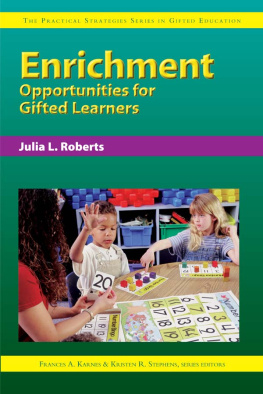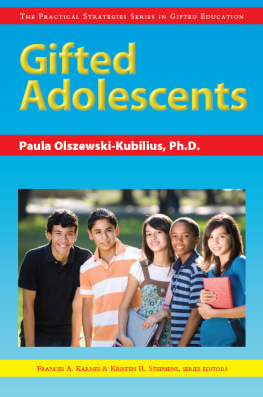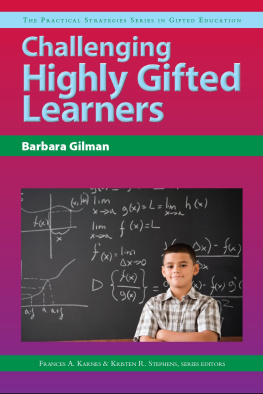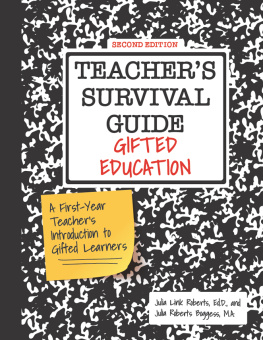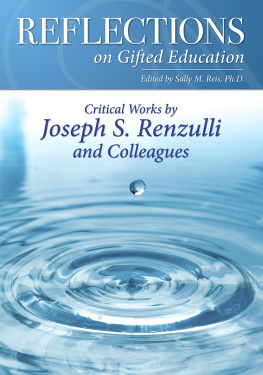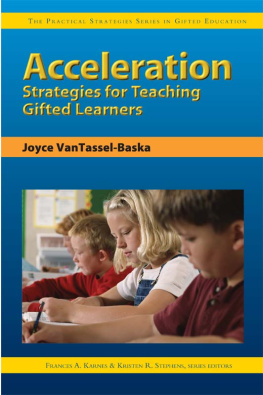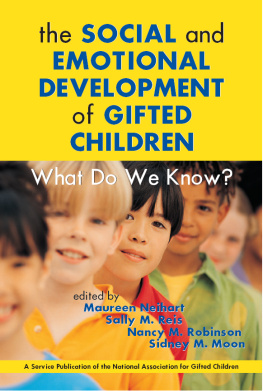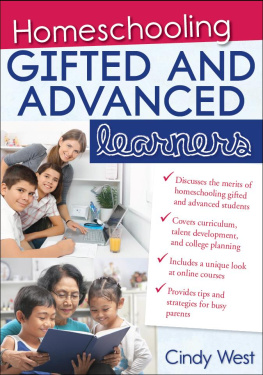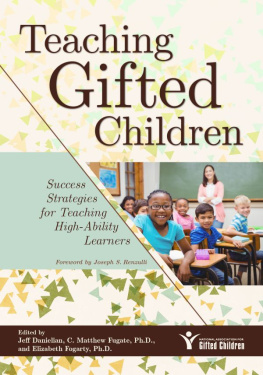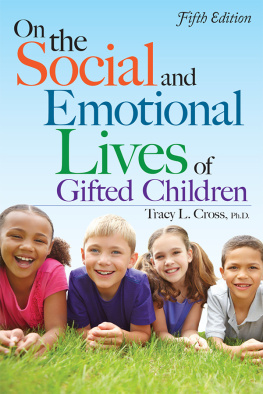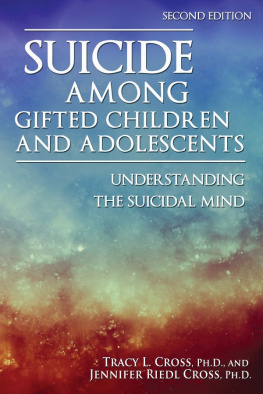THE PRACTICAL STRATEGIES SERIES
IN GIFTED EDUCATION
series editors
FRANCES A. KARNES & KRISTEN R. STEPHENS
Enrichment Opportunities
for Gifted Learners
Julia L. Roberts

P RUFROCK P RESS , I NC .
Copyright 2005 by Frances A. Karnes
and Kristen R. Stephens-Kozak
All rights reserved.
No part of this book may be reproduced, translated, stored in a retrieval system, or transmitted, in any form or by any means, electronic, mechanical, photocopying, microfilming, recording, or otherwise, without written permission from the publisher.
Printed in the United States of America.
ISBN-13: 978-1-59363-766-8
At the time of this books publication, all facts and figures cited are the most current available. All telephone numbers, addresses, and Web site URLs are accurate and active. All publications, organizations, Web sites, and other resources exist as described in the book, and all have been verified. The authors and Prufrock Press, Inc., make no warranty or guarantee concerning the information and materials given out by organizations or content found at Web sites, and we are not responsible for any changes that occur after this books publication. If you find an error, please contact Prufrock Press, Inc. We strongly recommend to parents, teachers, and other adults that you monitor childrens use of the Internet.

Prufrock Press, Inc.
P.O. Box 8813
Waco, Texas 76714-8813
(800) 998-2208
Fax (800) 240-0333
http://www.prufrock.com
Contents
Series Preface
The Practical Strategies Series in Gifted Education offers teachers, counselors, administrators, parents, and other interested parties with up-to-date instructional techniques and information on a variety of issues pertinent to the field of gifted education. Each guide addresses a focused topic and is written by scholars with authority on the issue. Several guides have been published. Among the titles are:
Acceleration Strategies for Teaching Gifted Learners
Curriculum Compacting: An Easy Start to Differentiating for High-Potential Students
Enrichment Opportunities for Gifted Learners
Independent Study for Gifted Learners
Motivating Gifted Students
Questioning Strategies for Teaching the Gifted
Social & Emotional Teaching Strategies
Using Media & Technology With Gifted Learners
For a current listing of available guides within the series, please contact Prufrock Press at (800) 998-2208 or visit http://www.prufrock.com.
Introduction
To enrich or not to enrich has often been the question. This question becomes increasingly important at a time when the major emphasis in many classrooms and schools is on mastering basic skills and core content at grade level. Enrichment opportunities are thus essential for those students who have already mastered the basic material. Educators who want all students to learn new things each day know it is imperative to offer enrichment opportunities to those who can demonstrate they already know most or all of what is being taught. Equity is offering learning experiences matched to needs, interests, and abilities; it is not offering the same learning opportunities to all children of the same age on the same time schedule. Life should be filled with enriching experiences that ensure that all children, including those who are gifted and talented, make continuous progress.
Enrichment is necessary because children differ. Even children born on the same day of the same year have different needs, interests, and abilities. For those who are gifted and talented, many of their needs are the result of their strengths. Strengths create the need for enrichment opportunities; and, if their identified strengths are to be enhanced, students must have opportunities to learn above and beyond what is expected for others their age. A child may be above grade level in all content areas or in only one. Even those who are gifted and talented differ considerably, so what is enriching for one may not be so for another.
Services for the gifted and talented need to include learning experiences with enrichment and acceleration opportunities. Some of these services will combine enrichment with acceleration in order to provide appropriate learning experiences for those students who are ready for more challenging opportunities to learn. Enrichment and acceleration are discrete services that work well in combination. The old question of whether it is better to accelerate or to enrich is meaningless, as students often need a combination of the two. The gifted and talented need to learn at a faster pace with more complex content; they need a rich curriculum with various opportunities that start with what they know and can already do.
The stakes are high for schools and communities when they plan to provide appropriate learning opportunities for those students who are ready for advanced learning. In an age of accountability, schools will increase their success on assessment when all children are learning at the highest levels possible. Otherwise, some children, including the gifted and talented, will be left behind. Providing appropriately challenging learning experiences, nurturing interests, and developing strengths yield citizens who can provide leadership in all areas of human endeavor, including space exploration, medical research, the visual and performing arts, and politics.
What Is Enrichment?
Enrichment describes experiences inside and outside the classroom that provide opportunities to learn above and beyond what is usually provided at a particular grade level. Enrichment is defined by Websters Dictionary as making something rich or richer, especially by the addition or increase of some desirable quality, attribute, or ingredient.
Renzulli and Reis (1997) described enrichment as learning activities that are designed to encourage creative productivity on the part of young people by exposing them to various topics, areas of interest, and fields of study and to further train them to apply advanced content, process-training skills, and methodology training to self-selected areas of interest (p. 14). Schiever and Maker (2003) stated, The goal of an enrichment program is to offer curriculum that is greater in depth or breadth than that generally provided; that is, to challenge and offer growth in the area of the students giftedness (p. 164). According to Coleman and Cross (2001), Enrichment is a broad term used to refer to program organization that extends, supplements, and sometimes replaces aspects of the schools structure. In its broadest interpretation, enrichment encompasses a number of modifications in standard educational practices (p. 298).
For this publication, the term enrichment refers to modifications a teacher makes to go above or beyond the regular curriculum for a student or a cluster of students who need advanced learning opportunities, and it includes programs or services that spark interests and develop skills and expertise both within the school and beyond in the local or broader community.
Enrichment comes in many configurations and can be delivered as various services to students. What they all have in common is that they offer opportunities to engage the learner beyond what is traditionally available at a particular grade level. Some configurations offer enrichment to one child, a pair of students, a cluster of children, or a class that has been grouped by interests, needs, and abilities.
Reasons for Enrichment
Enrichment provides students with opportunities to extend learning. There are three primary purposes for enrichment: fostering interest; nurturing talent, developing expertise, or both; and increasing achievement. Enrichment opportunities may address one, two, or all three of these purposes.
Next page
